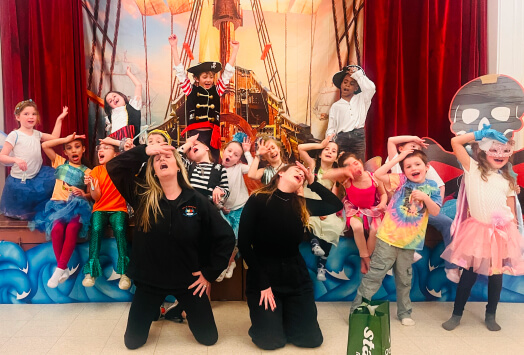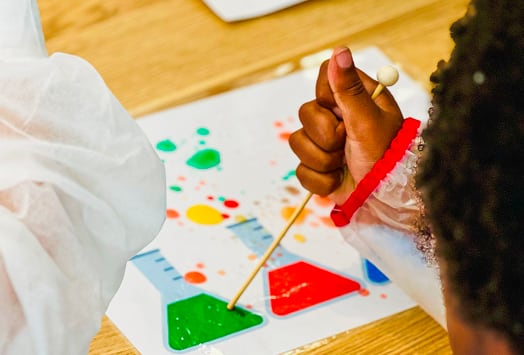It is important to get to know one another when you are bringing children and adults together for semester-long programs or even one-off after school or extracurricular activities. Not only are these introductory games helpful to fostering diversity and inclusion in the classroom, but also children will have an easier time making friends and feeling comfortable in class.
Icebreaker games and get to know your worksheets are a great way to build a sense of community with the children in your activities. Use our list of classroom icebreakers and then download our get to know you worksheet template so you can start this school year off on the right foot.
- Why are icebreakers important in the classroom?
- Icebreakers for kids
- ~Icebreaker games for kids
- Get to know your worksheet template
Why are icebreakers important in the classroom?
According to the Cornell Center for Teaching Innovation, icebreakers have many benefits in the classroom. They can help contribute to a more relaxed learning environment, allow students to feel more comfortable sharing their opinions, build rapport among students and instructors, and encourage collaboration.
Before you choose the type of icebreakers that you are going to use in your activities, you might want to think about a few questions.
- What are you hoping to achieve with these icebreakers?
- ~Do you want the students to get to know one another better?
- ~Do you want to learn more about the students? If so, what do you want to learn?
- ~Do you want to set the tone for the program moving forward?
- What is feasible with the amount of students, their age, and other demographic factors?
- ~If you have 30 students in your activity, then it might not be possible to go around the room and have everyone share 5 facts about themselves because it will take too long. Shorten the activity if you have a lot of students.
- ~If you are teaching Spanish to kids in a beginner level class, you likely cannot ask them to tell the class about themselves in Spanish for the icebreaker. You’ll need to do something that is more on their level.
- How much flexibility do you have?
- ~Icebreakers are generally open-ended and might not go as planned. Make sure you are ready for possible left turns or off topic answers from your students. Be ready to redirect and steer your students back on track.

Icebreakers for kids
Depending on the type of after school or extracurricular programming, your classroom icebreakers can be connected to the content, separate from the content, or a mix of both! For example, if you are teaching kids to code, you might go around the room and ask everyone to share why they are interested in coding and STEM. Or, if you have an advanced group of students, your icebreakers can include coding a short game or choose-your-own-adventure activity that shares information about the student.
On the other hand, you can do more general icebreakers that will help the students get to know one another and start the semester or class off with fun. Here are some of our favorite icebreakers for kids!
- The name game. Have the class go around the room and share their name and something that they love that starts with the same letter as their name. For example, “Hi my name is Ali and I love asteroids.” To add to the difficulty, you can have each student repeat what has been said before them!
- M&M facts. To start, have a bowl of M&Ms out and ask the students to take some but don’t eat them. Once everyone has a handful, tell the students that each color corresponds to a different topic. For example, blue can mean family, green can mean school, yellow can be friends, red can be hobbies, and brown can be entertainment. For each M&M they have, they need to share something about those topics. Then, they can eat them!
- Rose, thorn, and bud. Have your students go around the room and talk about their rose (something they love), thorn (something they are nervous about or unsure of), and bud (something that is exciting) for this program or class or just in general! This is a great way for students to build community and get to know one another. It will also help you get a better sense of each student and their interests.
Icebreaker games for kids
Sometimes, a little competition is the way to go! Consider incorporating some of these icebreaker games for kids into your early class sessions as well.
- 2 truths and a lie. Have the students write down 2 things that are true about themselves and 1 thing that is not. Then, their peers will have to guess which is the lie. This is a fun way to learn about the other students and have a little friendly competition.
- Pass the ball. Gather the students in a circle and hand out a beach ball. Start by having each student pass the ball to someone else and say their own name. Then, ask the students to pass the ball and say the recipient’s name. If the student doesn’t know someone’s name, they are out and the circle gets smaller. If they all know each other’s names, make it harder by saying their favorite food, book, or something similar.
- Group scavenger hunt. Sometimes, the best icebreaker is just a collaborative activity for the students. Set up a scavenger hunt and then separate your students into small groups. They will get to know one another by working together and solving problems as a team.

Get to know you worksheet template
If you want to learn more about your students than an icebreaker allows, you can pass out get to know your worksheets that only you will read. This is a good way for you to ask more personal questions that can help you interact with your students throughout the class and semester. Be sensitive, but make sure you get the information that you need! For younger students you can send these worksheets to their parents before your program starts.
Use our get to know you worksheet template to get started!
Download your "Get to know you" worksheet template
We hope that this guide has provided inspiration for your classroom icebreakers. If you are looking for guidance on managing and running your children’s education and activity business, the team at Sawyer is here to help.
With our suite of tools, like custom forms to record allergies and t-shirt sizes, flexible payment options like gift cards and installment plans, and seamless scheduling and registration on any device, Sawyer saves business owners 28 hours per month. If you are ready to spend less time on admin and more time doing more of what you love, see how Sawyer can help with a free trial or demo.





















.png)












.avif)
.avif)
.avif)
.avif)




